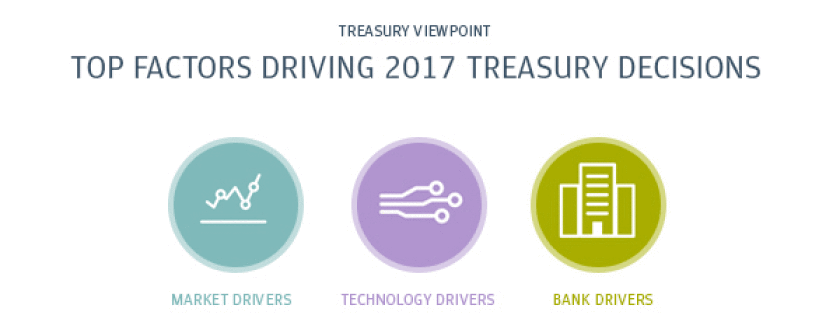Political risk
There is a clear disconnect between the sentiment among investors, which has been relatively upbeat about the implications of Trump's deregulation and tax reform agenda, and among treasurers, who are feeling the effects of the political uncertainty.
Political risk and currency market volatility are the biggest concerns for treasurers.
More than 45% of respondents feel pessimistic about the impact recent political developments will have on their businesses.
Around 20% of respondents expect new political forces to be advantageous. A similar number believe the positive and negative impacts are likely to broadly cancel each other out.
Interest rates
The survey shows rates remain a big concern among treasurers, despite the widespread expectation that the Federal Reserve will continue to follow a very gradual path of increases. Given that the Fed funds rate has been set to less than 1% since 2008, it is little surprise that corporates are anxious about how comfortable life will be above that level.
More than 40% of respondents say rate rises will have a big impact on their businesses.
Half of respondents expect US rates to be 1% to 1.25% at the end of this year.
More than 40% expect a steeper path of rates rises, but less than 12% expect them to be higher than 1.5%.
Around 8% expect rates to stay the same or fall by the end of the year.
Cash and liquidity management
With many expecting heightened currency market volatility to continue and perhaps even increase in 2017, there is a real focus on ensuring corporate treasurers have optimized their cash and liquidity management systems to ensure there is no disruption to operations.
More than 45% of the respondents say they have already reviewed their cash and liquidity management processes.
A quarter of respondents will review cash and liquidity management processes in the first half of the year, with another 5% planning to do so in the second half.
One in five see no reason to review their cash or liquidity management processes at all.
Digital, cyber security and big data
The global economy is going through a digital revolution that has profound implications for all businesses, both positive and negative. New systems will improve how companies interact with their customers and manage internal operations, but the increasing reliance on digital channels is also leaving them vulnerable to new kinds of risks.
Only one in five respondents feel their business is well prepared to deal with cyber attacks.
Nearly one in four admit they have a considerable amount of work to do to prepare their cyber security strategy.
More than two-thirds plan to invest in new digital technology within the next three years, despite only a quarter believing digital technology will have a big impact on their business. This might suggest corporates see digital technology as something of an arms race, in which they must invest simply to keep up with their competition.
Banks and third-party technology vendors are the biggest beneficiaries of corporate digital investment. Less than 10% of treasurers are looking to develop digital platforms in-house.
Under one in five respondents admit they have no plans to invest in digital technology, despite having made no such investment in the past two years.
Treasurers believe big data can help them better understand their customers and improve cash forecasting.
More than 30% of respondents feel a better understanding of their customers will be the biggest benefit to be gained from advances in big data. A fraction fewer predict cash forecasting will be the biggest benefit.
 |
Bank relationships
Corporate treasurers have some concerns about their bank relationships and want banks to show a greater level of commitment to their clients, amid concern that regulations like Basel are making it harder for them to serve their clients.
Half of treasurers are calling for improvements to their bank providers' digital channels and internet banking offerings.
Otherwise respondents are relatively evenly split on where they want to see better service from banks: between a quarter and a third want to see improvements to KYC and onboarding, account opening and product deployment, client service, and transaction accuracy and speed.
More than 56% of respondents intend to conduct a formal review of their treasury services banking suppliers this year.
Another 12% will review their treasury services banking suppliers in 2018.
Nearly a third say they have no plans to review their banking supplier relationships.
 |
For full results please click here
